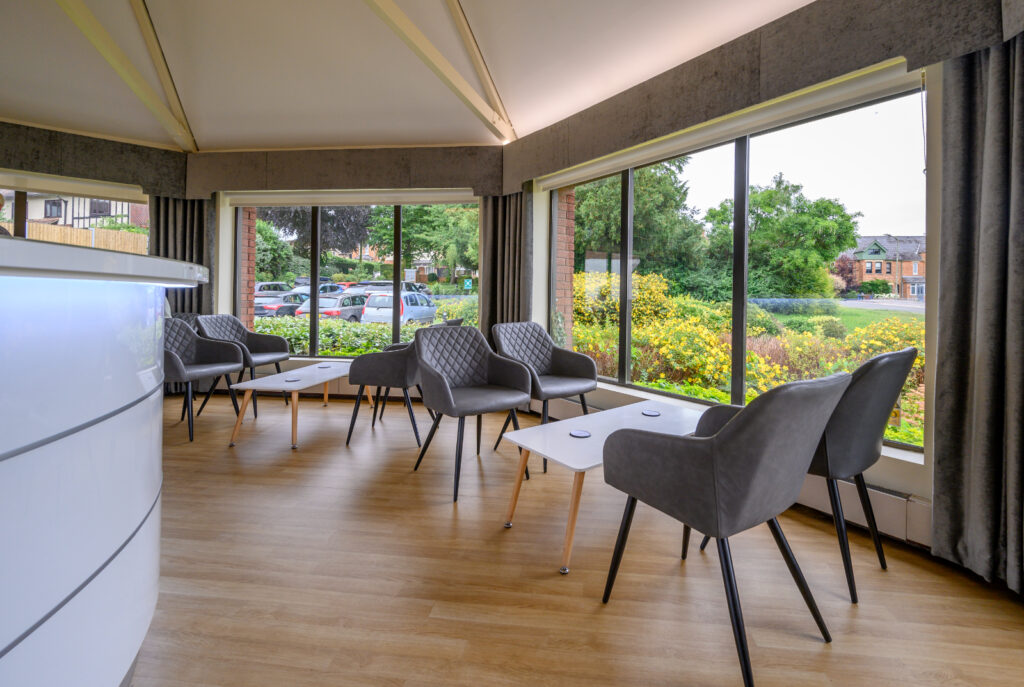Contents
Vestibular Disorders
Overview
Vestibular disorders arise when the inner‑ear balance organs or their brain connections malfunction. Sudden or persistent dizziness, vertigo and imbalance can make walking, driving and even turning in bed frightening.
At The New Foscote Hospital, Banbury you can access rapid consultant‑led diagnosis, on‑site 3 T MRI and specialist balance testing, followed by an outpatient vestibular‑rehabilitation programme designed to restore confidence and prevent falls.
Why Early Assessment Matters
- Rules out rare but serious causes such as stroke or acoustic neuroma
- Starts manoeuvres or exercises that stop vertigo sooner
- Reduces risk of falls, injury and anxiety‑related avoidance behaviour
- Identifies migraine or ear‑pressure triggers that medication can control
- Connects you to physiotherapy techniques that retrain your balance system
Typical Symptoms
- Spinning or swaying sensation when you move your head
- Brief vertigo when lying down, turning in bed or looking up (classic for BPPV)
- Sudden loss of balance with nausea and vomiting (vestibular neuritis)
- Fullness in one ear, tinnitus and fluctuating hearing with vertigo attacks (Ménière’s disease)
- Light‑headedness, visual blurring or “floating” feeling when walking
- Motion sensitivity in shops, scrolling screens or busy traffic (visual‑motion intolerance)
Common Causes And Risk Factors
- Benign paroxysmal positional vertigo (crystals in the inner‑ear canals)
- Vestibular neuritis or labyrinthitis following a viral infection
- Ménière’s disease linked to abnormal inner‑ear fluid pressure
- Vestibular migraine triggered by certain foods, stress or hormonal changes
- Acoustic neuroma (rare nerve sheath tumour)
- Head injury, whiplash or prolonged immobility
- Ageing – balance receptors and reflexes become less efficient
When To Seek Medical Advice
Call 01295 252 281 for an urgent appointment if you experience
- Repeated room‑spinning episodes lasting more than a few seconds
- Sudden vertigo with vomiting and unable to stand
- New hearing loss, ringing or pressure in one ear
- Trouble walking in a straight line or frequent near‑falls
Dial 999 immediately if vertigo is accompanied by facial droop, slurred speech, severe headache or double vision, as these may signal a stroke.
How We Diagnose And Monitor Vestibular Disorders
- Consultant Neurology Evaluation – detailed dizziness history, trigger diary review and bedside positional tests in our Neurology Service.
- On‑Site MRI Brain And Internal Auditory Canals – high‑definition scans in the Imaging Centre to exclude tumour, stroke or multiple sclerosis plaques.
- Video‑Frenzel Goggles And Head‑Impulse Testing – eye‑movement analysis to pinpoint affected ear canals.
- Audiometry And Tympanometry – hearing and middle‑ear pressure checks arranged on the same visit.
- Multidisciplinary Case Meeting – neurologist, audiologist, physiotherapist and dietitian agree your personalised plan.
- Progress Reviews – symptom scales and follow‑up testing every four to eight weeks to fine‑tune therapy.
Outpatient Treatment And Rehabilitation
- Epley Or Semont Manoeuvre – quick, on‑site repositioning for BPPV.
- Vestibular‑Rehabilitation Physiotherapy – gaze‑stability drills, balance retraining and graded exposure in the Physiotherapy Department gym.
- Migraine Control – tailored medication, trigger‑food advice and stress‑management strategies.
- Ménière’s Flare Management – low‑salt diet, betahistine therapy and fluid‑pressure monitoring.
- Home Exercise Videos – personalised routines to continue vestibular adaptation between sessions.
- Anxiety And Motion Sensitivity Coaching – breathing techniques and gradual re‑entry to busy environments with neuropsychology support.
- Return‑to‑Driving And Work Assessments – functional testing and liaison with employers or the DVLA when necessary.
Most clients attend 45‑minute therapy sessions once or twice per week for four to twelve weeks, with clear goals reviewed at every visit.
Why Choose The New Foscote Hospital
- Appointments with a consultant neurologist usually available within one week
- MRI, audiology and balance testing all on the same campus – no extra travel
- Highly experienced vestibular‑rehab physiotherapists using state‑of‑the‑art equipment
- Flexible outpatient scheduling, including early‑morning and evening slots
- Free on‑site parking, calm surroundings and easy access from Oxford, Warwick and Northampton
Frequently Asked Questions
Will My Vertigo Come Back After Treatment?
BPPV can recur, but you will learn self‑repositioning drills to stop attacks quickly. Long‑term vestibular rehab reduces relapse frequency in many conditions.
Do I Need To Stop Driving?
You must be free of sudden vertigo attacks before driving. Your consultant will advise and, if needed, provide paperwork for the DVLA.
Are Tablets Always Necessary?
Short courses of anti‑sickness or vestibular‑suppressant drugs help early on, but exercises and trigger management are the main long‑term treatments.
Steady Your World Again
Call 01295 252 281 or enquire online to book your vestibular‑disorder assessment and personalised rehabilitation programme.

18 July 2025
